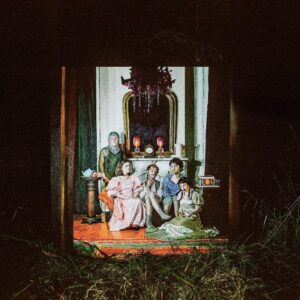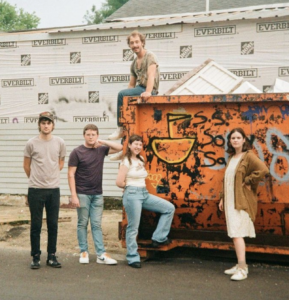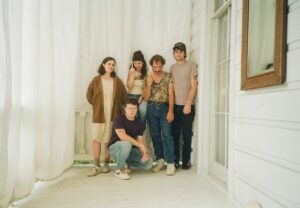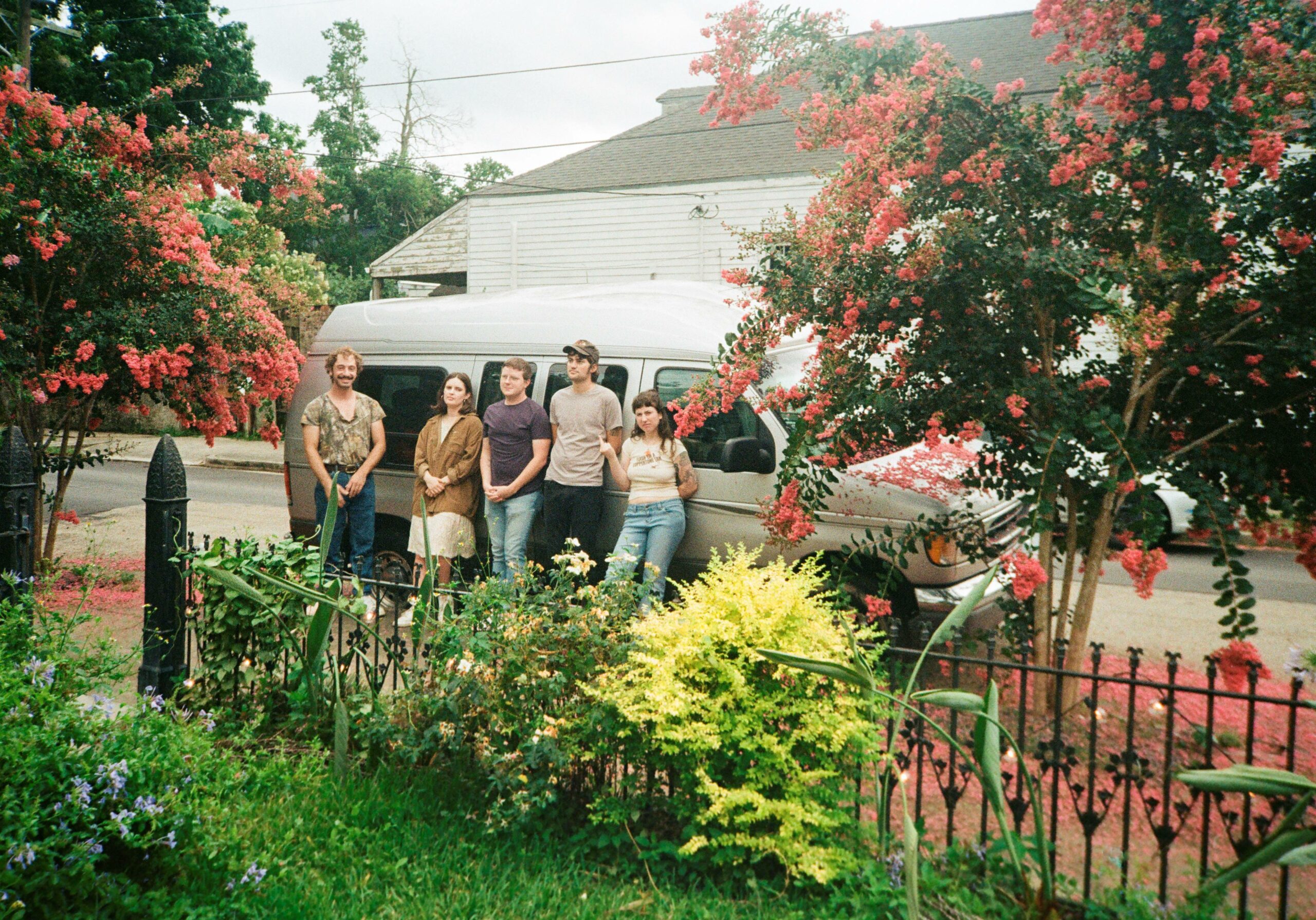Foto-© Zachary Chick
Dieser Tage erscheinen zum Beispiel mit dem selbstbetitelten Debüt der US-Amerikanerin Blondshell wieder einige tolle neue Indie-Alben – dazu gehört auf jeden Fall auch das neue Album Rat Saw God des Quartetts Wednesday aus Asheville, North Carolina, die mit einem etwas raueren Sound daherkommen – dafür aber in ihren Songs so vielschichtig wie ein Quilt wirken: eine Kurzgeschichtensammlung, eine verschwommene Erinnerung, ein Flickenteppich aus Porträts des amerikanischen Südens, der disparate Momente einfängt und als Ganzes doch irgendwie einen Sinn ergibt. Karly Hartzman, die Songschreiberin, Sängerin, Gitarristin und Leiterin des Projekts, ist eine Geschichtensammlerin als auch eine Geschichtenerzählerin: Eine aufmerksame Beobachterin von Menschen und witzigen Bemerkungen. Rat Saw God ist bildhaft, aber ebenso autobiografisch und vor allem sehr einfühlsam – und entstand unmittelbar nach der Fertigstellung des Vorgängers und Durchbruchsalbums Twin Plagues. Während dieses Album das Gefühl beschreibt, wirklich am Arsch zu sein, ein Trauma zu haben und Acid zu nehmen, erzählt das neue Wednesday-Album keine Epen, sondern das Alltägliche. Die Songs sind lebensnah, erzählen vom wahren Leben, sie sind verschwommen und chaotisch und seltsam zugleich – was Hartzmans eigenem Ethos entspricht: „Everyone’s story is worthy. Literally every life story is worth writing down, because people are so fascinating.” Wir sprachen mit Karly – unser Interview!
 I was introduced to Wednesday with your last LP, Twin Plagues, and you have a very specific sound and effect that only your band can give me: this kind of shoegaze country mix of aggression and sensitivity that’s really dedicated to honesty about how multitudinous people are. I have this thing where when I have a memory of something that that’s really traumatic or shameful to me and it kind of rears its head in my brain involuntarily, I start singing or humming to drown out. Your music really captures that feeling for me of trying to change your relationship to these memories with noise, but kind of allowing cracks of sensitivity through. A song like Chosen to Deserve, for example, there’s some pretty dark stuff in there. Skipping school, having sex in the back of an SUV, uh, witnessing friends overdose on Benadryl. But in a way, you’re kind of nostalgic for this stuff. Can you start by talking about your relationship to nostalgia and your take on nostalgia as a lens through which to view memory?
I was introduced to Wednesday with your last LP, Twin Plagues, and you have a very specific sound and effect that only your band can give me: this kind of shoegaze country mix of aggression and sensitivity that’s really dedicated to honesty about how multitudinous people are. I have this thing where when I have a memory of something that that’s really traumatic or shameful to me and it kind of rears its head in my brain involuntarily, I start singing or humming to drown out. Your music really captures that feeling for me of trying to change your relationship to these memories with noise, but kind of allowing cracks of sensitivity through. A song like Chosen to Deserve, for example, there’s some pretty dark stuff in there. Skipping school, having sex in the back of an SUV, uh, witnessing friends overdose on Benadryl. But in a way, you’re kind of nostalgic for this stuff. Can you start by talking about your relationship to nostalgia and your take on nostalgia as a lens through which to view memory?
I’ll start by saying I think I also do the thing when I get an embarrassing memory and sing to drive it away. I’m obviously a very nostalgic person. I’m kind of obsessed with memory. I love looking through old photo albums and hearing stories from my grandparents or parents even. I learn new things about my parents all the time that surprise me. Nostalgia has a big role in the music, obviously, but also I like the idea of chronicling personal history for myself and my family and my friends. So it’s mostly just an attempt for normal people to leave their mark more than just me trying to live forever in the past. Because people do have rich histories that are worth exploring and the more I learn about people close to me, the more I want to share their stories.
I was going to say that one thing that’s really specific about your brand of nostalgia is that it has this like degree of really rigorous honesty about it. And I think if you described what you would classically think of as nostalgia, it has this very sweet quality to it, like it’s the past seen through rose tinted glasses. I think you’re kind of pairing the beauty of memory with the harsh honesty of the reality of experience.
You can’t have one without the other. You have to be careful about seeing the past as like a better alternative to what you’re experiencing now, because the more you analyse your past, the more the dark stuff comes out. And I definitely try to confront that head on when it comes up because I inherently have kind of a dark past just because of some stuff that happened when I was a teenager. So any time I think back to those years, that stuff’s kind of unavoidable. So it’s not all a rose tinted thing because it can’t be out of necessity because anything good happened in the context of some really rough situations.

On the press cycle for Twin Plagues you talked about trying to get further away from those things by writing about them. On What’s So Funny of Rat Saw God, you kind of resolve to accept that some of that stuff is just going to be always there and trying to get a distance from it is kind of futile. You’ve also talked about how that honesty has kind of liberated you as well, because you said that having your mom hear these songs where you talk about drugs and sex – that kind of approach to writing changed things for you. Has it changed the way that you move through the world outside of your art as well?
Hmm. That’s a big question. Honesty is definitely a muscle you build over time. I think Rat Saw God is my most revealing album, and the more I reveal to the public about myself, the less inclined I am to make deep relationships with strangers, I would say, because there is so much widely known that you can know about me from listening to my music. I’m kind of trying to dig deeper with the friends I currently have, and I’ve gotten really close with my family. So it’s funny, I’m putting more out on the forefront, but I’m honestly becoming more reclusive, like more reclusive in my personal life because I just want to deeply know the people who knew this information from me, not from my music. So there’s like, all this information that you can gather on a public sense of me now because of all the interviews I’m doing, but in real life I’m like very focussed on just knowing the people I already know.
Well you do weave scenes from your family’s history into the music on Rat Saw God. Specifically on Quarry, which I think is really interesting because you lattice it with stuff from Lynda Barry’s illustrated novel Cruddy, and I love that the press release describes your writing as ekphrastic, a word that means writing about works of art. Who are some of your favourite writers?
It changes. My writing is always influenced by who I’m reading and listening to at the time of writing the album, obviously. I would say Richard Brautigan is going to be like a lifelong favourite writer of mine. But for this album specifically, yeah, I got really into Lynda Barry, who wrote Cruddy, and Mary Karr, who wrote a book retelling her dark family past. Kind of like what Quarry is about. She has a book called The Liar’s Club that’s just about her growing up and her parents and her sister. And then outside of fiction writers, I got really into country music storytellers like Tom T. Hall or I got really into Loudon Wainwright III, who’s like more of a comedian. But he writes really sad and funny songs. I kind of let any old thing inspire me if it hits the right notes. But those were just a few. What were your guesses?
 I wasn’t going to guess any of those. I was going to guess Joy Williams and also David Berman. I don’t know if you’ve read his poetry collection Actual Air.
I wasn’t going to guess any of those. I was going to guess Joy Williams and also David Berman. I don’t know if you’ve read his poetry collection Actual Air.
Yeah, I do have a copy of that wonderful book. Yeah, me and Jake who plays guitar in Wednesday, has read that, too. He has a book of comic strips called The Portable February that’s also really inspiring and good.
You said that what you’re listening to and reading really affects the way that you write, but the structure of your songs is really free and you’ve said that you find comfort in randomness. There’s like rarely a traditional chorus or else the whole thing is chorus. And that makes your songs really surprising and unexpected. I think Bull Believer is a perfect example of that, where we kind of go from this horrific bull fighting scene to the narrator screaming the line, “Finish Him!” from Mortal Kombat. How do you write and structure the songs? Do you write them as poems or stories first?
I mostly just kind of sit with a memory or a feeling, and I write down every detail I can remember. So for Bull Believer, I had this one night, a New Year’s Eve party from high school, that I kind of put myself in that room and then I thought of every image that came to mind randomly of everything that fit the tone and the feeling and described what ended up being the last night I spent with a friend of mine who passed away later that year. So that’s where all the emotions are coming from in that song. And then just like structurally, I knew I wanted to end up in a place where I was venting that pain from losing that person. And so I wrote what ended up being seven or whatever minutes of a song to prepare myself to get to that scream because I didn’t want to go there before I set the scene for myself, because it is painful to open up that memory. So it’s a long song because I needed it to be to describe the feeling. And that’s kind of how I write every song. I have a feeling I want to describe and I do whatever it takes to get there, whether it’s a song that’s all chorus or a song that prioritises instrumentation to set the tone. It’s all driven by emotion. There’s no song structure that I limit myself to.
When the band is writing together, do you just get into a room and jam it out or do you talk about what it’s going to sound like? Do you discuss those things or do you just dive in?
We definitely don’t talk explicitly about what the song is even about. They mostly can tell because we’ve known each other long enough and we’ve been playing long enough now to feed off how I’m playing and how I’m singing and support the emotion that’s there. It’s an unspoken thing, I would say. And sometimes we figure it out at band practice, like standing around, but other times we’ve not had time to do that before we record so we’ll do it instrument by instrument in the studio. But I trust them with the songs completely. I think that’s the reason it sounds so good. I give them the words and the basic chords, and they fill in the gaps very intuitively and always do a good job. I trust them a lot.
You said that you didn’t come from a musical family and that in the beginning you kind of struggled to find an entry point into creating music of your own. How did you learn to play at a later age? What resources did you use? Can you describe some breakthrough moments when things started to fall into place?
Yeah. So I’ve always wanted to be in a band since I had a friend make me a mix tape with My Bloody Valentine and Cocteau Twins and Deerhunter and stuff when I was in middle school, early high school, and that opened up a world to me. So ever since then I was like, I’m going to be in a band and it’s going to sound like a mix of all these things. I started off by like reading all of the music memoirs by every female musician I could find. The Carrie Brownstein one, Kim Gordon’s one, any music memoir I could find. In a lot of those, a lot of those ladies started when they were in college and had little music experience. So just knowing that that existed was really motivating for me. And then in college I watched Mitski’s Tiny Desk Concert and I noticed she was covering every string on her guitar for chords, and because I couldn’t play, I didn’t know how chords really worked, but I did know I could cover every string to make a chord. I figured out after noodling around on a guitar I bought for $100 from a friend of mine at the time that you could tune the strings to an open tuning to just have it so that you don’t even have to touch the guitar, it’s just a chord already because of the way you tune the strings. I wrote a bunch of my first songs like that, and then gradually, very slowly learned how to play actual chords. And I also just realised I could make up chords. I feel like the less I know about theory in general the more interesting my songs stay.

Nick Zammuto from The Books said that he tries to create a new tuning every time that he writes a song because it just makes it more interesting to write a song intuitively than to think about theoretically how it might work.
I think the only reason I don’t do that is because then I would need a bunch of guitars on tour and we simply do not have the room. I already write in too many tunings. I have to bring three guitars right now, and we don’t have a guitar tech, so it’s kind of chaotic. But I would love to write like that one day.
Can I ask you to tell the story of when you stayed at a punk house in Idaho and slept on the floor with a pet hog?
That was with a band I was in before Wednesday that I won’t say the name of. It was a pop punk band, but we were staying in St Louis at this house that was basically condemned. I mean, you’re doing DIY tours and you’re making no money. There was no option to stay in hotels. It was cold out, so you couldn’t sleep in the van, so the alternative was staying at this old house in this terrible neighbourhood, and we had to stay there for two nights. And it was this really sweet young person whose house it was, but, it was just like the scariest place I’d ever been. And they had a pet pig that would just walk around and it was like a hog. It was a full grown pig and so loud when it walked it was so scary because a big pig is a mass. It’s kind of freaky, and it would just go up and down the stairs and make these huge noises and it would just eat off of the ground. It’s my horror story from touring. And we were there two nights. We had to stay there two nights and it was just so scary. But it’s funny now, of course, because it’s been long enough.
That’s a crazy story. Are you looking forward to going on tour again or not so much?
Oh yeah. I love touring. I just love playing music, obviously. I think a lot of the stuff that’s not the actual show and touring is really hard, honestly, because I’m very introverted. So being around people all of the time for three months, it’s hard, but at the same time it’s like the best people I could imagine having to do that with because I’m with like my best friends. And we’re also going a bunch of places that we’ve never been, which is exciting.
 Where are you excited to go that you’ve not been?
Where are you excited to go that you’ve not been?
Honestly, anywhere the main language isn’t English is kind of exciting because I want to experience that complete fish out of water experience and eat a bunch of good food mostly. I don’t think it really is about any place specifically and more just like I’m excited for the people watching in each spot.
Apart from music, what is the most fun thing?
Hmm. That is so hard. Okay. I know for a fact for my partner, Jake, it would be sports, but I don’t give a shit about sports, so that is not my answer. Travelling is not my answer because I am a homebody and I travel for work. Technically, I enjoy it, but it’s not my favourite. Definitely not extreme sports, but I respect it. Books is kind of a good answer because you can go anywhere and do anything in a book. Movies – my attention span is too short. I watch movies when I can, but honestly, I’m watching Attack on Titan right now. It’s like an anime. I love stuff that moves really fast. It’s like the best characterisation ever and most interesting storylines. Not food, because I’m a terrible cook. I’ve been enjoying gaming. I play on my Nintendo Switch a lot of indie games that come out and experimental stuff. So like this game, Sally Face is like my favourite game of all time. It’s just like a dark storytelling extravaganza. I just think it’s such a cool medium for experimentation and storytelling. Sally Face is a mystery game and you just walk around this old apartment building and gradually learn about a mystery, but the style is just really cool and it’s made by like this one dude who did all the animation, all the music, all the dialogue, and it’s just like a look into his like little mind. I’ve played a lot of stuff like that.
Have you played The Witness? It’s kind of like that. I think there’s probably like two or three people that were making it. But it’s basically you start in first person and you walk forward and there’s a door in front of you and you draw a straight line from A to B on the door to open the door and the door opens. And then on the next door the rule about drawing the line from A to B is slightly more complex. And it goes on like that. For about 50 hours. You explored this island, and the only way that you can move through the island is by opening doors and by learning the language of the line drawing. So that’s my recommendation.
Interesting, any walking-sim kind of like that.
Have you thought about soundtracking a video game?
Honestly, no, because I know you have to know a lot about how spatial stuff works. Like, I know audio design is such an interesting thing, but the fact that you have to like, actually know stuff and keep it really scientific puts me off. I’m just not that interested in production. I feel like people that are interested in production are better suited for that. And also I kind of want video games to forever be a mindless escape for me that I don’t have to think about too much. So I don’t think I would ever want to contribute in that way unless they just used a song that already existed. I think it’s a cool thing, but not a goal of mine.
You guys could just play some really long drawn out chords, just like droning stuff. Do like a horror game soundtrack.
I do love a drone. Damn, you’re changing my mind because actually, it would be really fun because that’s exactly the kind of music I want to make eventually.
Thanks Karly!
Thank you!
Wednesday live:
27.05.23 Berlin, Schokoladen – ausverkauft










